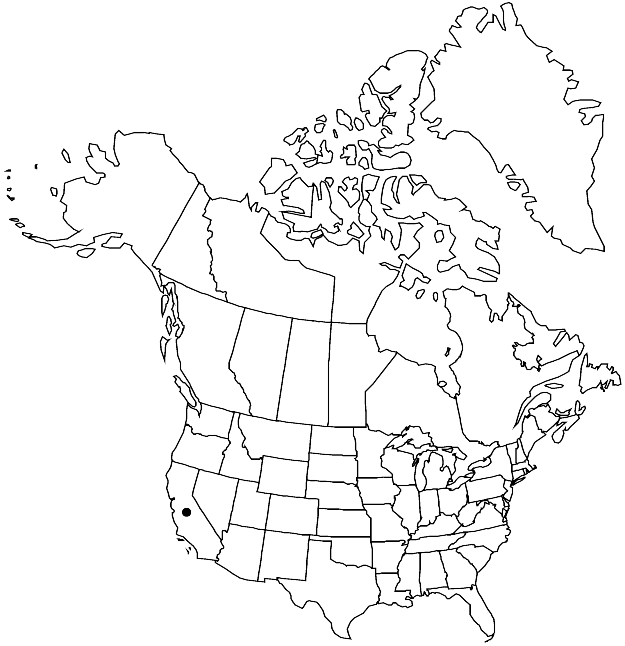Difference between revisions of "Streptanthus glandulosus subsp. glandulosus"
FNA>Volume Importer |
imported>Volume Importer |
||
| (5 intermediate revisions by 2 users not shown) | |||
| Line 1: | Line 1: | ||
{{Treatment/ID | {{Treatment/ID | ||
|accepted_name=Streptanthus glandulosus subsp. glandulosus | |accepted_name=Streptanthus glandulosus subsp. glandulosus | ||
| − | |accepted_authority= | + | |accepted_authority= |
|publications= | |publications= | ||
| + | |special_status={{Treatment/ID/Special_status | ||
| + | |code=E | ||
| + | |label=Endemic | ||
| + | }} | ||
|basionyms= | |basionyms= | ||
|synonyms={{Treatment/ID/Synonym | |synonyms={{Treatment/ID/Synonym | ||
|name=Euklisia aspera | |name=Euklisia aspera | ||
|authority=(Greene) Greene | |authority=(Greene) Greene | ||
| + | |rank=species | ||
}} {{Treatment/ID/Synonym | }} {{Treatment/ID/Synonym | ||
|name=Euklisia bakeri | |name=Euklisia bakeri | ||
|authority=Greene | |authority=Greene | ||
| + | |rank=species | ||
}} {{Treatment/ID/Synonym | }} {{Treatment/ID/Synonym | ||
|name=Euklisia biolettii | |name=Euklisia biolettii | ||
|authority=(Greene) Greene | |authority=(Greene) Greene | ||
| + | |rank=species | ||
}} {{Treatment/ID/Synonym | }} {{Treatment/ID/Synonym | ||
|name=Euklisia eliator | |name=Euklisia eliator | ||
|authority=Greene | |authority=Greene | ||
| + | |rank=species | ||
}} {{Treatment/ID/Synonym | }} {{Treatment/ID/Synonym | ||
|name=Euklisia violacea | |name=Euklisia violacea | ||
|authority=Greene | |authority=Greene | ||
| + | |rank=species | ||
}} {{Treatment/ID/Synonym | }} {{Treatment/ID/Synonym | ||
|name=Streptanthus albidus subsp. peramoenus | |name=Streptanthus albidus subsp. peramoenus | ||
| − | |authority= | + | |authority= |
| + | |rank=subspecies | ||
}} {{Treatment/ID/Synonym | }} {{Treatment/ID/Synonym | ||
|name=Streptanthus asper | |name=Streptanthus asper | ||
|authority=Greene | |authority=Greene | ||
| + | |rank=species | ||
}} {{Treatment/ID/Synonym | }} {{Treatment/ID/Synonym | ||
|name=Streptanthus biolettii | |name=Streptanthus biolettii | ||
|authority=Greene | |authority=Greene | ||
| + | |rank=species | ||
}} {{Treatment/ID/Synonym | }} {{Treatment/ID/Synonym | ||
|name=Streptanthus mildrediae | |name=Streptanthus mildrediae | ||
|authority=Greene | |authority=Greene | ||
| + | |rank=species | ||
}} {{Treatment/ID/Synonym | }} {{Treatment/ID/Synonym | ||
|name=Streptanthus peramoenus | |name=Streptanthus peramoenus | ||
|authority=Greene | |authority=Greene | ||
| + | |rank=species | ||
}} {{Treatment/ID/Synonym | }} {{Treatment/ID/Synonym | ||
|name=Streptanthus versicolor | |name=Streptanthus versicolor | ||
|authority=Greene | |authority=Greene | ||
| + | |rank=species | ||
}} | }} | ||
|hierarchy=Brassicaceae;Brassicaceae tribe Thelypodieae;Streptanthus;Streptanthus glandulosus;Streptanthus glandulosus subsp. glandulosus | |hierarchy=Brassicaceae;Brassicaceae tribe Thelypodieae;Streptanthus;Streptanthus glandulosus;Streptanthus glandulosus subsp. glandulosus | ||
| Line 61: | Line 76: | ||
-->{{#Taxon: | -->{{#Taxon: | ||
name=Streptanthus glandulosus subsp. glandulosus | name=Streptanthus glandulosus subsp. glandulosus | ||
| − | + | |authority= | |
| − | |authority= | ||
|rank=subspecies | |rank=subspecies | ||
|parent rank=species | |parent rank=species | ||
| Line 75: | Line 89: | ||
|publication title= | |publication title= | ||
|publication year= | |publication year= | ||
| − | |special status= | + | |special status=Endemic |
| − | |source xml=https:// | + | |source xml=https://bitbucket.org/aafc-mbb/fna-data-curation/src/2e0870ddd59836b60bcf96646a41e87ea5a5943a/coarse_grained_fna_xml/V7/V7_1232.xml |
|tribe=Brassicaceae tribe Thelypodieae | |tribe=Brassicaceae tribe Thelypodieae | ||
|genus=Streptanthus | |genus=Streptanthus | ||
Latest revision as of 22:31, 5 November 2020
Stems 1–10 dm, densely to moderately hirsute proximally, moderately to sparsely so distally. Cauline leaves: blade conduplicate or flat distally, margins entire or denticulate, surfaces densely to sparsely hirsute. Racemes not secund; rachis straight. Fruiting pedicels 3–15 mm, sparsely pubescent or glabrous. Flowers: sepals reddish purple, dark maroon, or lilac-lavender, 5–13 mm, sparsely pubescent or glabrous; petals lavender to purple (with or without darker purple veins), 8–17 mm; adaxial filaments 8–13 mm. Fruits ascending to divaricate or reflexed, straight or arcuate; valves glabrous or sparsely pubescent. 2n = 28.
Phenology: Flowering Apr–Jul.
Habitat: Rocky, often barren, ultramafic or metamorphic (Franciscan formation) slopes, chaparral openings, steep slopes in woodland
Elevation: 0-1400 m
Discussion
As delimited here, subsp. glandulosus is hetero-geneous, with varying flower color, fruit orientation, and indumentum density. It grows in Alameda, Colusa, Contra Costa, Lake, Mendocino, Monterey, Napa, San Benito, San Luis Obispo, Santa Barbara, Santa Clara, Solano, Sonoma, Stanislaus, and Tehama counties.
Selected References
None.
